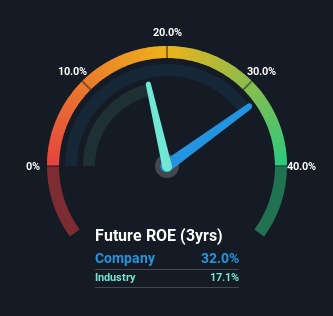Stock Analysis
- Saudi Arabia
- /
- Hospitality
- /
- SASE:9567
Is Ghida Al-Sultan Company (TADAWUL:9567) A High Quality Stock To Own?

One of the best investments we can make is in our own knowledge and skill set. With that in mind, this article will work through how we can use Return On Equity (ROE) to better understand a business. We'll use ROE to examine Ghida Al-Sultan Company (TADAWUL:9567), by way of a worked example.
ROE or return on equity is a useful tool to assess how effectively a company can generate returns on the investment it received from its shareholders. In other words, it is a profitability ratio which measures the rate of return on the capital provided by the company's shareholders.
Check out our latest analysis for Ghida Al-Sultan
How To Calculate Return On Equity?
The formula for return on equity is:
Return on Equity = Net Profit (from continuing operations) ÷ Shareholders' Equity
So, based on the above formula, the ROE for Ghida Al-Sultan is:
32% = ر.س19m ÷ ر.س58m (Based on the trailing twelve months to June 2023).
The 'return' is the profit over the last twelve months. One way to conceptualize this is that for each SAR1 of shareholders' capital it has, the company made SAR0.32 in profit.
Does Ghida Al-Sultan Have A Good Return On Equity?
One simple way to determine if a company has a good return on equity is to compare it to the average for its industry. The limitation of this approach is that some companies are quite different from others, even within the same industry classification. As is clear from the image below, Ghida Al-Sultan has a better ROE than the average (17%) in the Hospitality industry.

That is a good sign. However, bear in mind that a high ROE doesn’t necessarily indicate efficient profit generation. Aside from changes in net income, a high ROE can also be the outcome of high debt relative to equity, which indicates risk. To know the 3 risks we have identified for Ghida Al-Sultan visit our risks dashboard for free.
How Does Debt Impact ROE?
Companies usually need to invest money to grow their profits. That cash can come from retained earnings, issuing new shares (equity), or debt. In the case of the first and second options, the ROE will reflect this use of cash, for growth. In the latter case, the debt used for growth will improve returns, but won't affect the total equity. That will make the ROE look better than if no debt was used.
Ghida Al-Sultan's Debt And Its 32% ROE
One positive for shareholders is that Ghida Al-Sultan does not have any net debt! Its ROE already suggests it is a good business, but the fact it has achieved this -- and doesn't borrowings -- makes it worthy of further consideration, in our view. After all, with cash on the balance sheet, a company has a lot more optionality in good times and bad.
Summary
Return on equity is one way we can compare its business quality of different companies. Companies that can achieve high returns on equity without too much debt are generally of good quality. If two companies have the same ROE, then I would generally prefer the one with less debt.
Having said that, while ROE is a useful indicator of business quality, you'll have to look at a whole range of factors to determine the right price to buy a stock. Profit growth rates, versus the expectations reflected in the price of the stock, are a particularly important to consider. So I think it may be worth checking this free this detailed graph of past earnings, revenue and cash flow.
Of course Ghida Al-Sultan may not be the best stock to buy. So you may wish to see this free collection of other companies that have high ROE and low debt.
Valuation is complex, but we're helping make it simple.
Find out whether Ghida Al-Sultan is potentially over or undervalued by checking out our comprehensive analysis, which includes fair value estimates, risks and warnings, dividends, insider transactions and financial health.
View the Free AnalysisHave feedback on this article? Concerned about the content? Get in touch with us directly. Alternatively, email editorial-team (at) simplywallst.com.
This article by Simply Wall St is general in nature. We provide commentary based on historical data and analyst forecasts only using an unbiased methodology and our articles are not intended to be financial advice. It does not constitute a recommendation to buy or sell any stock, and does not take account of your objectives, or your financial situation. We aim to bring you long-term focused analysis driven by fundamental data. Note that our analysis may not factor in the latest price-sensitive company announcements or qualitative material. Simply Wall St has no position in any stocks mentioned.
About SASE:9567
Ghida Al-Sultan
Ghida Al-Sultan Company engages in the fast-food restaurant and franchise business in the Kingdom of Saudi Arabia.
Flawless balance sheet and slightly overvalued.

